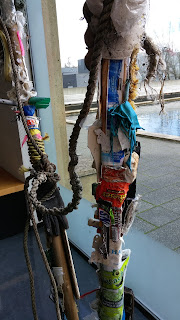Lent and Climate change chapel decor
My heart is breaking for reasons I can't share here. But it is. That is that. One of the strange tokens of wisdom from having grieved deeply is I know things could be worse.
One of the bright spots has been that for the first time in my life I have some art on display. This public art has been at the Chapel of St. Ignatius for the season of Lent. Here are some photos of the art in the chapel as well as the reflection to accompany it.
One of the bright spots has been that for the first time in my life I have some art on display. This public art has been at the Chapel of St. Ignatius for the season of Lent. Here are some photos of the art in the chapel as well as the reflection to accompany it.
Reflection on our Lenten Artwork
This Lent the Seattle University community is examining our contribution to the causes of climate change and our place in the solution. As we pray, give alms, and fast during the Lenten season we consider climate change in our Lenten practice.
Many of us love the beach; the constancy of waves, the daily rhythm of tides.
Perhaps briny smell of saltwater or the callus scream of seagulls invokes a romantic peacefulness.
Our beaches are full of the driftwood of Douglas Firs and Western Red Cedars
The seaweed hosts new life, the rocks and pebbles click together.
Our beaches are also littered with refuse.
In examining our place in the cause and the solutions of climate change we are using debris found on the shores of Puget Sound beaches to visually remind us of the ways that we bring about the suffering of other people and of our beloved home earth in our sustained mindlessness and inaction. As you look around the chapel you will find gatherings of debris leading you to the altar. You will see on each of these gatherings familiar things, industrial things, Styrofoam, wrappers and all sorts of trash we discard every day.
As you take in the visual debris, the discarded rubbish and pollution gathered from our shores consider how this might be a reflection for your Lenten journey. Here are some questions to consider:
Where is the pollution in your life? What practices do you cling to that contribute to the pollution in your life? Your relationships? Your world?
Who are the discarded people in your world? What individuals or groups do you refuse to consider or listen to?
As a consumer what ways are you furthering climate change and choosing ignorance over action?











Comments
Post a Comment